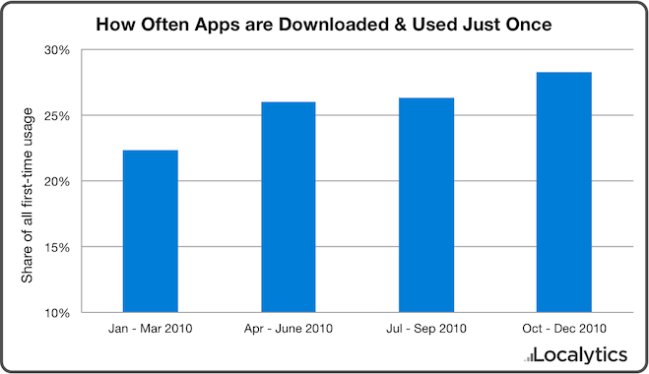
Have you ever downloaded a random app in the middle of the night, and then never opened it after you fell asleep? Yeah, so have we — and new data proves we’re not alone: Out of the roughly 400,000 iPhone and iPad apps and 200,000 Android apps currently on the market, an average of 26 percent of those apps bought in 2010 were used just one time, reports mobile application analyst Localytics.
Using their real-time analytics software, Localytics looked at thousands of apps across every major mobile platform, including Android, iPhone, iPad, BlackBerry and Windows Phone 7. Based on this data, the Cambridge, MA-based analytics company found that for people who downloaded an app for the first time between January and March of 2010, 22 percent of them never opened the app again. That number, however, increased to 28 percent by the fourth quarter of 2010, which could give some developers hope that the trend is waning.
The good news for developers is that, while many of mobile app users are fickle, they are often willing to try new apps — an encouraging fact for publishers trying to break into the cut-throat world of mobile apps.
Localytics, which offers its analytics software to developers to help them dig deeper into their user-base, suggests that app publishers focus less on the pure number of people who download their apps — many of which, the data says, will never use an app more than once — and instead work to build a loyal group of customers.
“Tracking downloads is often a first step to gauging an app’s success,” writes Localytics’ Brian Suthoff on the company blog, “but download stats often provide an incomplete and inflated view.”
The report suggests that first impressions mattered most in turning first-time app triers into long-term buyers. “In order to build a profitable business in this hyper-competitive market,” writes Suthoff, “publishers need to understand who their loyal users are and how to continue growing a loyal user base.” Something Localytics would be more than happy to help them discover, at least once.
Editors' Recommendations
- The 10 best photo editing apps for Android and iOS in 2024
- 8 iPhone browser apps you should use instead of Safari
- How to sync your iPhone with your iPad for seamless use
- Arc Search is one of the best iPhone apps I’ve ever used
- How to use WhatsApp Web


